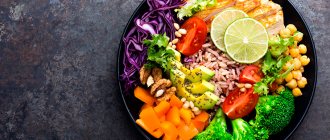Fruitarianism (a subtype of vegetarianism) is a type of diet in which mainly raw plant fruits are consumed, which make up 75% of the total diet.
Adherents of fruitarianism justify this type of nutrition for several reasons:
- Ethical - promoting respect for the ecosystem as a whole and for plants as its individual representatives.
- Nutritional – as a way to reduce calories consumed, normalize weight and lose weight, detoxify.
- Evolutionary - based on the (not scientifically substantiated) assertion that humans are frugivorous by nature.
According to adherents, fruitarianism also helps to become more friendly, get rid of food addiction, strengthen the psyche, immunity, improve brain activity and lose weight.
Among the significant advantages is saving time due to the absence of the need to prepare food.
Fruitarian principles
Ideally, only raw fruits should be eaten.
Sometimes it is allowed to include legumes, seeds, and grains in the menu, but provided that it is not necessary to destroy plants to extract these products.
Some adherents of this type of nutrition eat only those fruits that have independently separated from the stalk and fallen to the ground during the ripening process, or under the influence of other factors (that is, they do not pick the fruits themselves).
One of the variations of fruit eating is a diet, in which 80% of the diet is formed from fruits, another 10% each comes from fats and protein. In this case, it is allowed to replace some of the fruit with leafy greens.
Fruitarianism involves following 5 principles:
- Eating one type of fruit per meal. To eat another type of fruit, you need to wait an hour and a half.
- The amount of food is not limited; you need to focus on the feeling of fullness. For the same reason, there are no clear restrictions on the number of meals or the intervals between them.
- With strict fruitarianism, the fruits are consumed raw. Only peeling them is allowed.
- Spices, flavor enhancers and other additives are not used.
- Only organic products grown primarily in the region of residence are consumed.
Side effects
Full fruitarianism has not become widespread due to the impossibility of creating a balanced diet based only on fruits. Research by scientists has shown that long-term fruit nutrition leads to anemia, damage to tooth enamel, lack of calcium, magnesium, iron, vitamins B12, E. A and D. Despite the large amount of absorbed beta-caratine (vitamin A), it is poorly absorbed without fatty acids . Omega-3 deficiency affects hair, skin and nails. Almost all fruitarians are underweight.
• Anorexia
• Anemia
• Gastrointestinal disorder
• Osteoporosis
• Weakness of the heart muscle
The disadvantages of fruitarianism also include economic factors. Organic fruits are hard to find or they are incredibly expensive. It is doubtful that eating apples from a chain supermarket can improve someone's health. To get a more or less balanced diet, you need to buy as many different fruits as possible.
Authorized Products
The menu is based on fresh fruits: apples, pears, bananas, mangoes, peaches, nectarines, apricots, plums, papaya, pineapple, kiwi, lychees, grapes, cherries, strawberries, blueberries, blackberries, oranges, tangerines, limes, lemons, grapefruit. Dried fruits and goji berries are acceptable.
If desired, the diet may include:
- legumes (beans, lupine, lentils, peas);
- grains (wheat, rice, oats, rye, corn, quinoa, buckwheat, barley, millet, amaranth);
- seeds (sunflower, pumpkin, flax, sesame, hemp, poppy, chia).
Many foods that most people classify as vegetables or other plant groups are fruits and can also be included in a fruitarian's diet.
These include: cucumbers, sweet peppers, zucchini, tomatoes, avocado, coconut, olives, melon, chestnuts, cashews, almonds, walnuts, hazelnuts, Brazil nuts, and eggplants.
Fruitarian menu
Justifications
Adherents of such a food system often justify its feasibility with historical examples. For example, they mention that currently some peoples of Asia and Africa eat exclusively fruits, and people remain healthy and hardy.
» />
There are a number of other justifications for this type of nutrition that its adherents give:
Ethical – it is important to respect all living things, including plants, and not cause harm unnecessarily, while achieving optimal health. By the way, many fruitarians minimize the use of things made from plant materials and avoid items made from animal materials. Nutritional - fruits are well absorbed by the body, they are healthy and relatively inexpensive
They prevent the active reproduction of pathogenic microorganisms, thereby maintaining human health. Evolutionary - anatomical features of the body indicate that man is a frugivorous creature. Since childhood, a person feels a craving for sweets, so it is ripe fruits that best satisfy this desire.
In addition, there are many environmental, economic and other reasons for fruitarianism that its fans cite.
Disadvantages of fruitarianism: possible harm
When consuming fruit alone, adherents of fruit eating may encounter problems such as:
Weight gain
When switching to fruitarianism, there is usually weight loss. But in the future, the process may reverse due to the abundance of sugar in most fruits and their high calorie content (this applies, first of all, to bananas, pears, plums, and dried fruits).
Over time, the body will begin to feel a lack of energy due to the lack of protein and complex carbohydrates (if you give up grains and legumes), which will lead to an increase in fruit consumption and an increase in calorie intake. Moreover, these products are fast carbohydrates and do not provide a feeling of fullness for a long time.
In addition, the lack of fat and protein puts the body into starvation mode:
- metabolism slows down
- digestion worsens,
- gas formation increases,
- intestinal spasms are observed,
- constipation or diarrhea, bloating.
Protein deficiency
Due to a lack of amino acids, not only the muscular system suffers, but also the skin, hair, and nail plates. Chronic fatigue is noted. Physical activity is more difficult, especially strength and high intensity.
Therefore, it is preferable to supplement the diet with seeds, legumes, and grain products.
No healthy fats
Fatty acids are necessary to maintain skin elasticity, brain function, and the hormonal system.
When giving up animal fats, at least partially, you need to replace them with avocados, nuts, and seeds.
Avitaminosis
Not all the elements necessary for the body are found in fruits. Fruit eating is fraught with deficiency of zinc, calcium, iron, vitamin D, group B, E, iodine, selenium.
Diabetes risk
Berries, dried fruits, bananas and other menu components contain a lot of sugar. Their systematic use in large quantities worsens the condition of the pancreas and the absorption of insulin.
If you have diabetes or prediabetes, fruitarianism is contraindicated.
Caries
Sugar and acid, which are rich in apples, kiwi, strawberries, oranges, lemon and other fruits, cause erosion of tooth enamel. The condition of teeth is also worsened by a lack of calcium. Deficiency of this element also negatively affects the skeletal system.
Mood swings
Jumps in glucose levels lead to agitation and a surge of strength being abruptly replaced by irritability, weakness and apathy. Headaches, insomnia, and depression are common. Concentration deteriorates and performance decreases.
Where to start a raw food diet: a guide for a beginner raw foodist
Switching to a proper raw food diet is not for everyone. Why, you ask? Let's figure it out together...
How to create a balanced diet?
The World Health Organization officially recommends eating at least 5-6 servings of vegetables and fruits daily. That's about 450g. There are studies that show that if you eat more of them, it's even better. For example, scientists from the UK recently proved that 7 or more servings of vegetables and fruits per day, each 80 g, reduce mortality by 42%, and 5 servings - only by 36%. In some countries, recommendations to consume more than 5 servings have already been made before. For example, in Australia they recommend eating 5 servings of vegetables and 2 servings of fruit per day. And this is really useful: it protects the heart, blood vessels and prevents most types of cancer.
If you switch to such a diet, keep in mind that at first, bowel movements may be more frequent. This is normal and even beneficial, this is how an increase in fiber intake is manifested.
Where do watermelons come to us from? AiF investigation Read more
Precautionary measures
In the long term, fruitarianism cannot be considered a healthy diet. It is impossible to obtain all the necessary elements from fruits. Such a diet is fraught with iron deficiency anemia, chronic fatigue, osteoporosis, decreased immunity, and amenorrhea.
Fruitarianism is unacceptable for diabetes, hypoglycemia, ulcers, pancreatitis, chronic diarrhea, and renal failure.
If you want to switch to fruit eating, your diet should not change dramatically. “Forbidden” foods should be replaced with fruits gradually. This will prepare the digestive system for a new type of nutrition.
You must first visit a doctor. The specialist will assess whether there are any contraindications to this type of nutrition and prescribe the necessary dietary supplements to help compensate for the lack of vitamins and minerals.
Abrupt transition
Even if you feel like a healthy person and have never seen a doctor in your life, we would not advise you to change your diet so radically. Even trained raw foodists and vegetarians have difficulty in the first weeks of eating fruit. What then can we say about omnivores, who are accustomed to consuming thermally processed animal and plant protein and whose entire digestive tract is designed specifically for such food?
Although some fruitarianism gurus believe that a sudden transition is better, you only have one health and you shouldn’t risk it. The Internet is filled with stories of people suddenly switching to fruitarianism from scratch, however, there are just as many stories of early mortality. Do everything gradually, so you will have more chances to become a real devotee of this movement and confirm the ideas of fruitarianism with your longevity.
A new look at the evolution of human nutrition (Artem Demchukov)
Book
Have you ever wondered why waste, toxins and bad breath appear in the human intestines? How does this affect our health? In the human intestine, toxic compounds are formed that are responsible for various metabolic disorders in our body. This all occurs when eating high-protein foods that the intestines are simply not able to process.
But try to exclude foods with a high concentration of protein from your usual diet and switch to a fruit diet:
- get rid of excess fat deposits and look younger than your age;
- improve intellectual activity;
- clear consciousness, improved memory, good mood and ease of perception of the surrounding world;
- physical endurance and flexibility;
- With a complete refusal of meat, in some cases extrasensory abilities are acquired.
Of course, there are also “pitfalls” here - this is the complexity of the transition to fruitarianism, and the active resistance of loved ones who do not share the idea of your new lifestyle, and misunderstanding in the eyes of acquaintances, who are often critical of such unusual changes in your life.
But still, in the end, the right of choice is always yours! And perhaps someday your choice will fall on this unique way of eating, which can decisively change your entire future destiny.
Be careful when changing eating habits.
The transition from omnivorism to fruitarianism is a very difficult step. For people who are overweight, chronically ill, or have allergies, eating this way may be the only path to healing and transformation. And yet it is wrong to regard this direction as a panacea.
Without a clear and correct understanding of the principles of fruitarianism, a person can cause irreparable harm to the body. There is plenty of evidence of this; you just need to look at thematic forums. You shouldn’t take someone else’s example as a standard; you need to adequately assess the state of your own body.
Ultimately, food should provide strength, energy and satisfaction, not hunger hallucinations and nervous breakdowns.
General information
One type of vegetarianism is fruitarianism. This is its most strict variety, since its main principle is the consumption of exclusively fruits (in other variations, the menu consists of 2/3 of them).
A moderate version of this type of nutrition also includes the introduction of nuts, seeds and seeds into the diet. Very often, fruitarians consume only fresh fruits, refusing any heat treatment. Therefore, at their core, adherents of this diet are raw foodists. At first glance, these dietary principles may seem healthy, but in fact they can cause a very large number of serious health problems. Many people who practiced fruitarianism were convinced from their own experience that such a nutritional system is dangerous for the body. More information about the principles and features of such a diet can be found in the article below.
Reviews and results of the power system
Svetlana, 28 years old, Moscow
For a long time I could not get rid of excess weight. I decided to try a fruit diet. The transition to such a diet was difficult. Lasted 2 months. I lost 12 kg. Later she switched to a vegetarian diet. The result stuck.
Irina, 29 years old, St. Petersburg
On the advice of a friend, I switched to a fruitarian diet. I couldn’t keep it for a long time. Within a week my stomach started to hurt. I had to return to the principles of healthy eating again.
Famous fruit eaters
Perhaps the most famous follower of mono-fruitarianism was Steve Jobs. The Apple founder liked to take his diet to extremes and claimed that it helped him maintain his creativity.
Interesting fact. Ashton Kutcher, who won the role of Steve Jobs in the biopic, had to stick to fruitarianism for a month. As a result, 2 days before the start of filming, he was admitted to the hospital due to problems with the pancreas.
There are followers of fruitarianism among the actors. For example, Jared Leto said in an interview that he has been practicing vegetarianism for 20 years. And recently I switched to eating only fruits. Although from time to time, for the sake of a role in a film, the actor deviates from his diet.
It turns out that even fruitarianism and sports are compatible concepts. Among the followers of the nutrition system was the famous bodybuilder Jim Morris. True, his diet included not only fruits, but also greens, nuts, and beans.
Also considered the most famous fruit eaters are Dr. Douglas Graham, marathon runner Michael Artnstein, blogger Freely, and farmer Richard Gambino. These people are in excellent physical shape and appear happy and positive.











